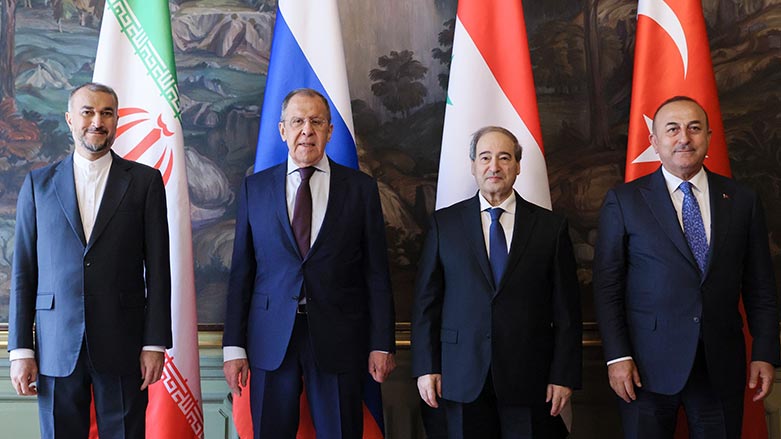Turkey and Syria agree to improve ties after talks in Moscow

MOSCOW (AP) — Syria and Turkey agreed Wednesday to set up a “roadmap” to improve strained ties, following talks alongside Russia and Iran in Moscow.
The agreement comes a week after Syria and Arab governments meeting in Jordan agreed to establish a roadmap of their own to resolve Syria's lengthy civil war and bolster ties. Syria has been returning to the Arab fold and slowly restoring ties with its neighbors.
The Arab League also readmitted Syria's membership after a 12-year suspension in the onset of the conflict on Sunday, before Saudi Arabia delivered a formal invitation earlier Wednesday to President Bashar Assad to attend the upcoming summit in Jeddah.
Throughout the 12-year conflict, Turkey has backed armed opposition groups in the country's northwest seeking to remove Assad from power. The Syrian government has frequently denounced Ankara’s hold over parts of a northwest enclave previously seized by Assad’s opponents. Turkey captured the territory through several military incursions since 2016 against U.S.-backed Kurdish forces.
Russia on the other hand intervened militarily in Syria starting in September 2015, and alongside Iran played a pivotal role in keeping Assad in power and to reclaim much of the country back. Moscow has maintained a military presence in the Mideast country even as the bulk of its forces are busy fighting in Ukraine.
Moscow has spent years trying to help Syrian President Bashar Assad rebuild ties with Turkey and other countries that were fractured in the war, which has killed nearly 500,000 people and displaced half of Syria’s prewar population of 23 million.
Russia’s foreign minister on Wednesday hosted his counterparts from Turkey, Syria and Iran for talks that marked the highest-level contact between Ankara and Damascus since the start of the Syrian civil war over a decade ago.
Talks to establish a plan to improve relations between Turkey and Syria would be done in coordination with ongoing communication between the four countries' defense ministries.
“The ministers noted the positive and constructive atmosphere of the exchange of views and agreed to continue high-level contacts and technical talks in the quadripartite format in the coming period,” a statement from the Russian Foreign Ministry after the talks read.
The statement added that they called for more international aid to Syria, not only to help the country's struggling population but also “in the interests of voluntary, safe, and dignified" refugee returns and post-war reconstruction.
The efforts toward a Turkish-Syrian reconciliation come as Turkish President Recep Tayyip Erdogan is under intense pressure at home to send Syrian refugees back amid a steep economic downturn and increasing anti-refugee sentiment. He is seeking reelection on Sunday, when Turkey holds both presidential and parliamentary elections.
Syrian state media quoted Syrian Foreign Minister Faisal Mekdad as saying during Wednesday's meeting that Syria and Turkey “share goals and common interests.” He said that “despite all the negatives over the past years," Damascus saw the talks as an opportunity "for both governments to cooperate with the help and support of our friends Russia and Iran.”
Yet Mekdad added that the Syrian government’s “main goal” was to end all “illegal” military presences in the country, including that of Turkish forces.
“We will continue to demand and insist on the subject of withdrawal,” he was quoted as saying.
Following a deadly earthquake in February that killed tens of thousands of people in Syria and Turkey, regional normalization with Damascus began to accelerate. In April, Moscow hosted the defense ministers of Turkey, Syria and Iran for talks that it said focused on “practical steps to strengthen security in the Syrian Arab Republic and to normalize Syrian-Turkish relations.”
